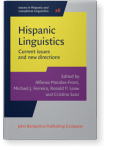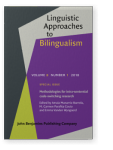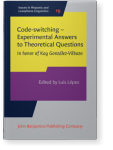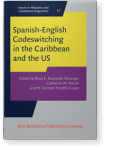Bryan Koronkiewicz
List of John Benjamins publications for which Bryan Koronkiewicz plays a role.
2020 Subject-predicate code-switching: Testing the need of a matrix language through embedding Hispanic Linguistics: Current issues and new directions, Morales-Front, Alfonso, Michael J. Ferreira, Ronald P. Leow and Cristina Sanz (eds.), pp. 249–264 | Chapter
There is continued debate on what determines the rule-governed behavior of intrasentential code-switching. Central to this debate is whether it is essential to differentiate between the languages involved, i.e., a matrix language and an embedded language. In favor of such an approach is… read more
2018 Monolingual stimuli as a foundation for analyzing code-switching data Methodologies for intra-sentential code-switching research, Munarriz-Ibarrola, Amaia, M. Carmen Parafita Couto and Emma Vanden Wyngaerd (eds.), pp. 25–66 | Article
Among methodological concerns specific to code-switching (CS) research is the design of the target stimuli used in experiments with an acceptability judgment task. We argue here that research which makes use of CS data of this type must also incorporate monolingual stimuli into the experimental… read more
2018 Modality in experimental code-switching research: Aural versus written stimuli Code-switching – Experimental Answers to Theoretical Questions: In honor of Kay González-Vilbazo, López, Luis (ed.), pp. 147–176 | Chapter
Various methodological concerns are specific to code-switching research; however, the modality of experimental stimuli has yet to be thoroughly investigated. This study explicitly tests if the mode of presentation does in fact affect participants’ judgments in Spanish-English code-switching using… read more
2016
Tú y yo can codeswitch, nosotros cannot: Pronouns in Spanish-English codeswitching Spanish-English Codeswitching in the Caribbean and the US, Guzzardo Tamargo, Rosa E., Catherine M. Mazak and M. Carmen Parafita Couto (eds.), pp. 237–260 | Article
Pronouns have been generally reported to be ungrammatical in intrasentential codeswitching (CS) (Gumperz, 1977; Lipski, 1978; Timm, 1975; among others). However, pronouns can be found in a variety of syntactic, prosodic and/or phonological contexts, the full breadth of which has yet to be… read more



